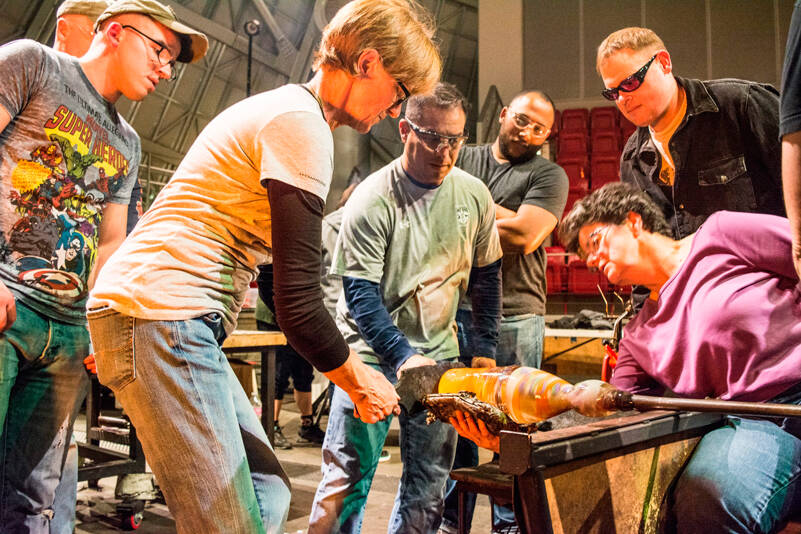TACOMA, WA. — One of Museum of Glass’s landmark community programs, Hot Shop Heroes™, is celebrating its 10th year. When Tacoma native and world-renowned artist Dale Chihuly rented the Museum for soldiers and their families on President’s Day in 2013, Lieutenant General Robert Brown of Joint Base Lewis-McChord (JBLM) hoped this connection between the military and MOG would grow. Later that year, MOG partnered with the Soldier Recovery Unit (SRU) at JBLM to create a program that would not only teach soldiers glassblowing skills, but also serve as a form of art therapy for those returning from combat. As a result, Hot Shop Heroes was born.
“I have personally seen the transformative nature of Hot Shop Heroes. There are students that have come in the first day barely communicating, and over time, I have seen the smiles start to creep in when they come to the class. I have seen some students find a renewed love and sense of purpose, and remember what it is like to be in the presence of others. Whether it’s the community-focused aspect of the program or working in a team environment again with other active military and vets with similar challenges, the students find something that affirms life in our program,” said Hot Shop Heroes Program Manager Jabari Owens-Bailey.
Hot Shop Heroes is a core education program at Museum of Glass, offering eight-week glassblowing and flameworking classes to participating soldiers at introductory and intermediate levels. During Hot Shop Heroes’ pilot classes, the program served SRU soldiers with complex and devastating physical and mental injuries. The attention and teamwork needed to blow glass can be therapeutic, especially for individuals with traumas and injuries that have occurred during military service.
“Hot Shop Heroes to me is not only a place to be educated about glass, but a place to go to have the camaraderie with people that you are familiar with. For people that are transitioning from the service, some who have been in the service for 10 or 20 years, it’s quite a change. When they offered the class to me, I didn’t want to be in group sessions. I wanted to do solo work, but really found out that glassblowing is a team effort. And now I do enjoy that aspect of it. And now as I’ve gained great friends, and become more and more involved going to more classes, I became an instructor myself. Art can be very helpful. It has provided me the opportunity to look outside myself and reflect on things that are good for me,” said program participant and instructor John Obermuller.
The program is particularly effective for participants with Traumatic Brain Injury and Post-Traumatic Stress Disorder. Previous participants have identified the social and emotional benefits of Hot Shop Heroes, recognizing that through the team environment, they have become open to the joy in creating art, coping with anxiety, and interacting with others in a healthy manner.
With classes designed around different levels of glassmaking skills, Hot Shop Heroes allows participants to continue honing their skill sets, which reach beyond the walls of the Museum’s Hot Shop studio to new job opportunities.
“Sometimes military members can feel isolated even when they are stationed in a place, so for them to be able to come into a community organization, and feel like they are part of the community, they can take pride. We feel very taken care of and so honored to be in this place and instructed by these professionals. Being in the Hot Shop, you are challenged in a different way physically, mentally, and creatively, so it helps relieve stress, and you feel accomplished that you get to make something. Everyone looks forward to coming every week,” said program participant Daniella Fremstad.
Hot Shop Heroes relies on outside funding to continue providing classes to soldiers and veterans. There is no cost for participating students.
Classes are Monday (Beginner Course) and Wednesday (Intermediate Course) evenings at 5:00 pm for 8-week fall, spring, and winter sessions. During the summer months the Museum runs a production class where the participants create work that is sold in the Museum Store with half of the proceeds benefitting the program.
Museum of Glass is proud to be a Blue Star Museum. May 20, through September 4, active-duty military personnel and up to five family members can receive free admission to the Museum as part of the National Endowment for the Arts’ Blue Star Museums Program. All branches of the armed forces are eligible, including the National Guard and Reserve.
About Museum Of Glass: Located in Tacoma, Washington, Museum of Glass is a premier contemporary art museum dedicated to glass and glassmaking with the West Coast’s largest and most active museum glass studio. Opened in 2002, the Museum has established a reputation for hosting impactful and engaging artist residencies, organizing nationally traveling exhibitions, and creating unique programs for visitors while building a growing permanent collection chronicling the development of modern and contemporary glass. Museum of Glass provides an environment for artists and the public to ignite creativity, fuel discovery, and enrich their lives through glass and glassmaking.
Quick Facts
Museum of Glass has displayed over 140 exhibitions since 2002, featuring glass art pioneers such as Dale Chihuly, Lino Tagliapietra, and Preston Singletary.
Over 100,000 visitors explore the Museum each year.
The Hot Shop hosts over 35 Visiting Artist Residencies each year.
The Museum has engaged over 200,000 children through educational programs.
750 soldiers and veterans have been served through the Hot Shop Heroes program
Address: 1801 Dock Street, Tacoma, WA 98402
Hours: 10am-5pm, Wednesday – Sunday. Third Thursday of every month, 5am-8pm, free admission
Admission: $20 – Adults; $18 – Seniors (65+)/College Students (18+)/Military (Active and Veteran); $12 – Children (6–18); Free – Children (under 6); Free – Museum Members; $1/person; $2/family – EBT Cardholders





